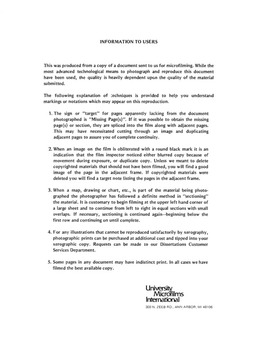| dc.contributor.author | Buehrig, Grant Sanders, | en_US |
| dc.date.accessioned | 2013-08-16T12:28:29Z | |
| dc.date.available | 2013-08-16T12:28:29Z | |
| dc.date.issued | 1982 | en_US |
| dc.identifier.uri | https://hdl.handle.net/11244/4950 | |
| dc.description.abstract | To address some of these issues, this study constructs a Monte Carlo simulation model to examine the expected outcomes of buffer stock intervention for the ten core commodities in terms of three success criteria: (1) price stabilization, (2) ICO profitability, and (3) consumer and producer welfare effects. This approach recognizes the inherent uncertainty associated with random market forces that affect individual commodity supply or demand. The paper also uses sensitivity analysis to evaluate important tradeoffs among the criteria resulting from the selection of alternative policy tools--intervention price and bandwidth, fund endowment, and buffer stock size. | en_US |
| dc.description.abstract | The benchmark scenario uses proposed UNCTAD levels for financial and commodity resources. Simulation analysis suggests that most commodity organizations generally would stablilize price, be profitable, and increase the total welfare for producers and consumers taken together. | en_US |
| dc.description.abstract | Less Developed Countries that depend on primary commodity exports for virtually all their foreign exchange earnings traditionally have faced severe economic problems due to highly volatile world commodity markets. The LDCs contend price instability leads to wide fluctuations in export income, declining terms of trade, and ultimately a sacrifice of overall welfare and economic growth. A growing awareness of the adverse impact of price stability on these LDCs culminated in the adoption of the Integrated Program for Commodities by the United Nations Conference on Trade and Development in 1976. The main objective of this plan is to promote economic development in the LDCs based on a comprehensive price stabilization scheme. Progress to date on International Commodity Organizations has met with only limited success mainly because of disagreements within the North-South dialogue over the assumptions regarding the consequences of price instability and the uncertainties surrounding how effectively market intervention would achieve IPC goals. | en_US |
| dc.format.extent | x, 322 leaves : | en_US |
| dc.subject | Economics, Commerce-Business. | en_US |
| dc.title | International commodity agreements : | en_US |
| dc.type | Thesis | en_US |
| dc.thesis.degree | Ph.D. | en_US |
| dc.thesis.degreeDiscipline | Department of Economics | en_US |
| dc.note | Source: Dissertation Abstracts International, Volume: 43-02, Section: A, page: 0508. | en_US |
| ou.identifier | (UMI)AAI8215784 | en_US |
| ou.group | College of Arts and Sciences::Department of Economics | |
